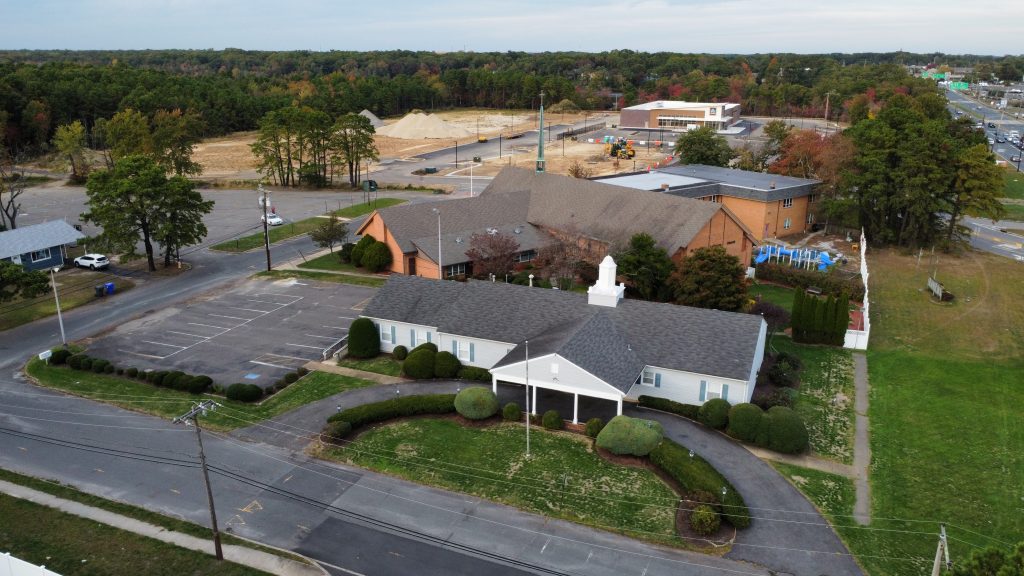
An aerial view of St. Thomas Lutheran Church and the proposed site of Temple Beth Or, Brick, N.J. (Photo: Daniel Nee)
A hearing date has been set for a new application by Temple Beth Or to convert a former funeral home to its new house of worship in Brick Township.
Shorebeat reported last month that the small congregation would try for a second time to convince members of the township’s Zoning Board of Adjustment that they should be able to move into the former Laurelton Funeral Home on Salmon Street, which was purchased by Temple Beth Or last year. Though the congregation owns the funeral home property, it has not been able to meet or worship there since the building is zoned for a funeral home use, and houses of worship are considered “conditional” uses in the zone which require a hearing before the board. After dozens of neighboring residents opposed the temple’s application last fall, a vote for approval failed to gain a supermajority among the board members, resulting in a “statutory denial” despite a 4-3 outcome.
Temple Beth Or will appear before the board again on Jan. 31, this time with a number of clarifications to its application and a pre-ordained pledge to limit the occupancy and number of seats in the building in order to better comply with parking requirements. Opponents of the plan to open the temple – which usually attracts only about a dozen worshipers for weekend services – made parking the center of their opposition, testifying that their neighborhood has become busier with the opening of several new businesses on nearby Chambers Bridge Road, and additional traffic could create a safety risk. Further, they were concerned that given the decline in attendance at religious institutions in recent years, the site could be purchased by another party in the future that could conceivably produce more volume than the temple.
|
|
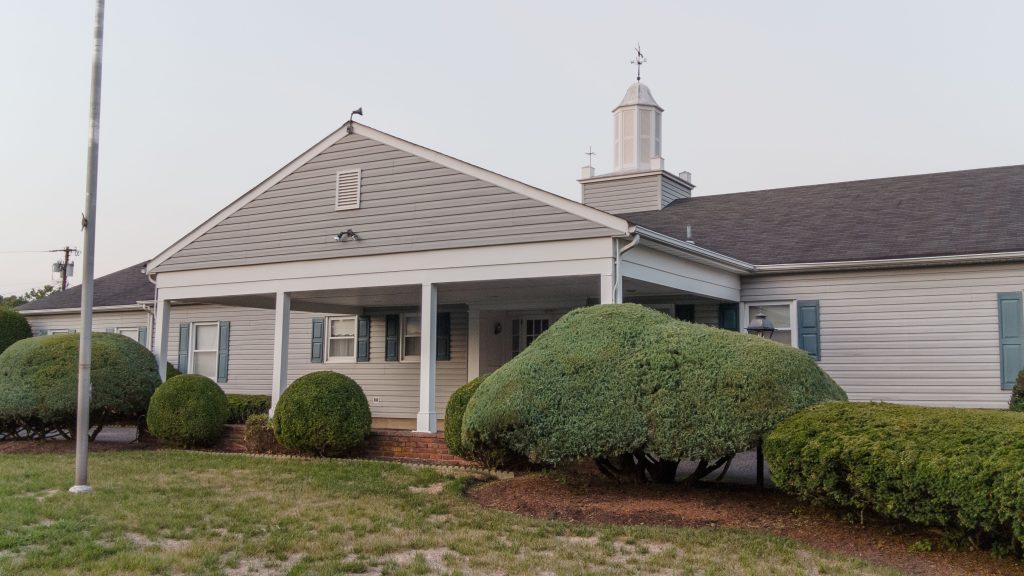
The proposed location for Temple Beth Or, in the former Laurelton Funeral Home building, Brick, N.J., Sept. 2022. (Photo: Daniel Nee)
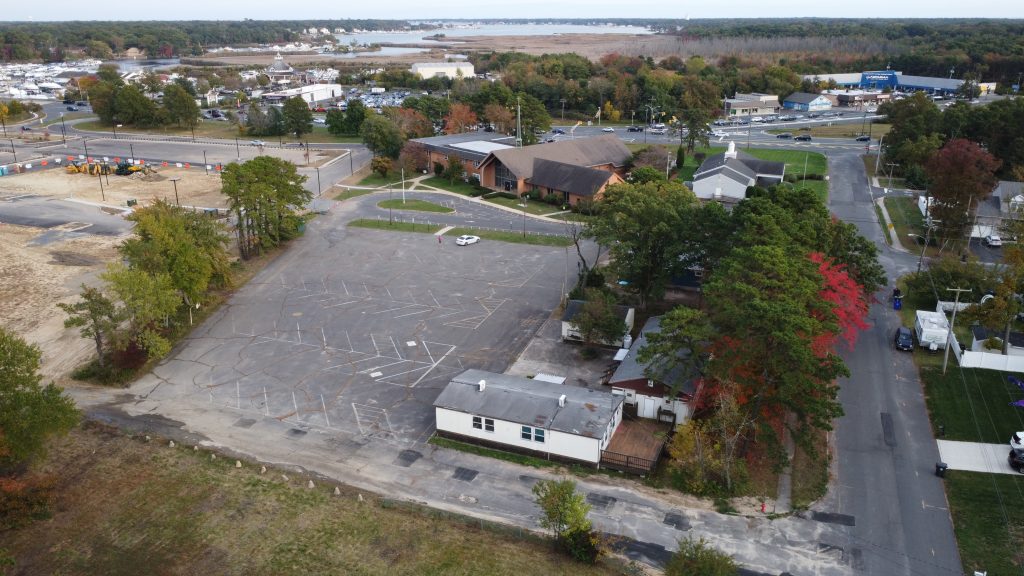
An aerial view of St. Thomas Lutheran Church and the proposed site of Temple Beth Or, Brick, N.J. (Photo: Daniel Nee)
Board members, last fall, struggled with the temple’s answer over the parking issue. Despite only a handful of worshipers coming to services, and about 50 on two or three holidays per year, Brick Township calculates parking requirements for houses of worship based on the number of seats in the building or the total occupancy, whichever is greater. Currently, there are 15 on-site parking spaces, though the temple has secured a 25-year lease with neighboring St. Thomas Lutheran Church to use its expansive parking lot. Still, as the Lutheran church was not a party to the application, the board found itself on shaky ground relying upon the arrangement to overcome the conditions in the zone.
This time, the application will go to board members with strict, voluntary limits on seating and occupancy in order to come closer to the township’s parking requirements. According to a zoning notice published this week, the temple has proposed “a facility with a sanctuary that will be strictly limited to 60 chairs.”
Brick’s ordinance requires parking of one space per four seats, or for every four persons who may be legally admitted, whichever is the maximum. The temple has proposed voluntarily allowing approval to be conditioned on a legal limit occupancy of the sanctuary to 56 people.
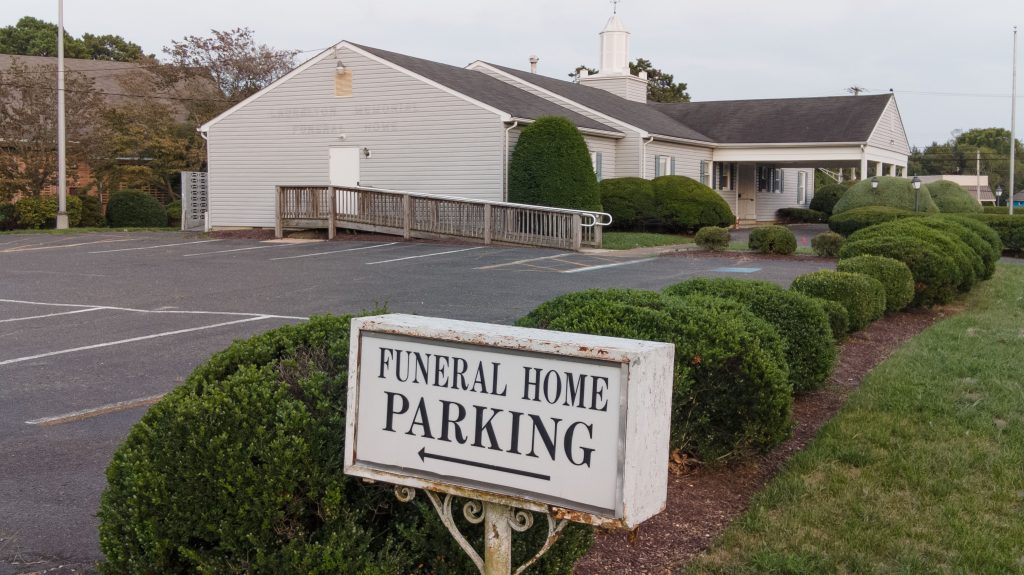
The proposed location for Temple Beth Or, in the former Laurelton Funeral Home building, Brick, N.J., Sept. 2022. (Photo: Daniel Nee)
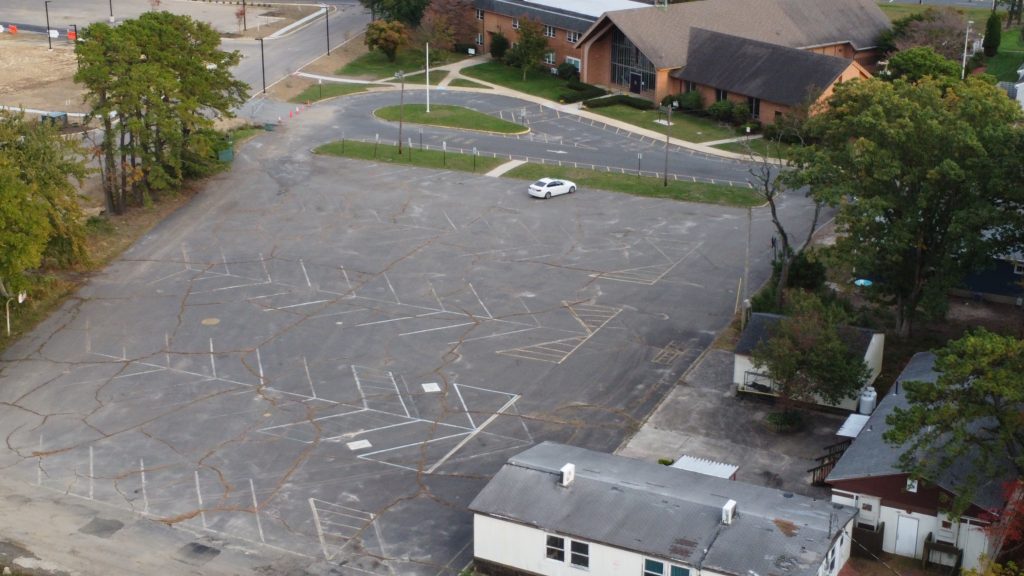
An aerial view of St. Thomas Lutheran Church and the proposed site of Temple Beth Or, Brick, N.J. (Photo: Daniel Nee)
Additionally, the temple has proposed a condition of approval that would prohibit the simultaneous use of the sanctuary and the other areas of the building. The seating in the non-sanctuary area of the building includes a conference room with 10 seats, a social area that can accommodate 48 seats at tables and an executive office area with a total of 9 seats. The total number of seats equals 124, though they would be unable to fill all of the seats at one time. If all of the seats – regardless of whether they are occupied – are counted, 31 parking spaces would be required based on seating calculations. The temple has 15 on its own property, but has again proposed the 25-year lease on St. Thomas’ parking lot.
“The applicant proposes that the continuation and availability of this lease be a condition of approval, and a further condition be that the services at the temple be scheduled so as not to conflict with the times of services at St. Thomas,” the notice said.
Another Option
In the notice, attorney John Jackson, representing the temple, said he would simultaneously propose an alternative application – full use variance approval instead of the conditional use variance.
Houses of worship, pursuant to both state and federal laws, are considered inherently positive uses and must represent a substantial detriment in order to fail to overcome such a designation. If the board will not grant a variance to allow the temple to operate as a conditional use, full use variance approval would be sought, and such a case would be judged on its own merits. If the matter were to eventually be decided by a judge, sitting either in federal or state court depending on the strategy employed by attorneys, the traditional use variance could potentially be justified given the inherent positive nature of a house or worship under the law.
The case will be heard before the zoning board at its Jan. 31, 2023 meeting, which is scheduled for 7 p.m. at the township municipal complex on Chambers Bridge Road.











